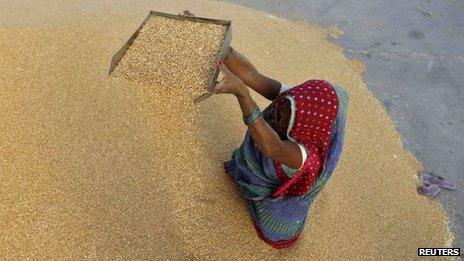India starts subsidised food plan
- Published

The scheme aims to combat hunger, but has been called impractical and unaffordable
The Indian government has launched a programme to provide subsidised food to two-thirds of the population.
The food security scheme launched by Congress Party head Sonia Gandhi aims to give 5kg (11lb) of cheap grain each month to about 800 million poor people.
It went ahead even though the controversial Food Security Bill which maps out this welfare scheme is yet to be approved by parliament.
Critics say it is a profligate plan which will hurt India's economy.
They have dismissed it as a political gimmick ahead of next year's general election.
India accounts for a third of the world's poor and supporters say such assistance will help reduce poverty and hunger.
The food security programme was officially launched by Mrs Gandhi in the capital, Delhi, to coincide with the anniversary of the birth of her late husband, former Prime Minister and Congress leader Rajiv Gandhi.
She handed out special cards to a group of women which entitles them to cheap grain supplied by government fair price shops.
Four other states, ruled by the Congress, will also launch the scheme on Tuesday.
Controversial law
Earlier this month, the government tabled the Food Security Bill in parliament. The ambitious legislation, which will cost 1.3tn rupees ($23.9bn; £15.8bn) a year, is being called one of the world's largest welfare schemes.
It proposes to provide a kilo of rice at three rupees, wheat at two rupees and millet at one rupee.
The measure will apply to 75% of Indians living in rural areas and 50% of the urban population.
The bill was an election promise made by the ruling Congress party and its implementation is expected to help the party in general elections due next year. But it has had a rocky journey through the legislative process.
Last month, the cabinet passed the measure as an ordinance and President Pranab Mukherjee signed it into law. The ordinance needed parliamentary approval within six weeks of its first sitting to become law.
Opposition parties criticised the government for passing the measure as an ordinance, after failing to win parliamentary support. The government withdrew the ordinance before tabling the bill in the parliament.
Despite impressive economic growth in recent years, India still struggles to feed its population and has more malnourished children than any other country in the world.
- Published12 March 2012
- Published21 December 2011
- Published10 January 2012